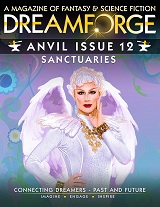 DreamForge Anvil #12, Summer 2023
DreamForge Anvil #12, Summer 2023
“Thread” by Bret Nelson
“The Park” by Teresa Milbrodt
“Count It an Anchor” by Taffy Lamba
“The Rainmakers” by Megan M. Davies-Ostrum (reprint, not reviewed)
“A Language Older Than Words” by Andrew Giffin
Reviewed by Victoria Silverwolf
Four new stories appear in this issue. The first three feature witches operating in fantastic versions of the modern world. The final story offers a taste of science fiction for dessert. (It should be noted that the piece “Asylum” by Gretchen Tessmer, although labeled as fiction, is actually a brief free verse poem, a fact confirmed by the author’s notes.)
In “Thread” by Bret Nelson, witchcraft is performed by organizations serving business corporations by offering practical services such as teleporting merchandise. The protagonist works for such an organization. She also happens to be dependent on oxycodone. Her employers offer her a way to free herself from her addiction.
The premise of what one might call mundane magic is an interesting one, developed in a plausible way. (One gently satiric note is that the organization, in order to meet diversity goals, reluctantly hires men as witches.) This aspect of the story is more interesting than the main character’s struggle with opioid dependence, as powerful and important a theme as that might be.
A witch of the kind found in folklore and fairy tales is the narrator of “The Park” by Teresa Milbrodt. She now lives in a trailer park, having given up devouring children and helping heroes with quests long ago. Her neighbors are threatened with eviction when the company that own the park plans to raise their rent. With the help of other residents, she finds a way to solve the problem.
There is actually little or no fantasy content in this story, save for the narrator’s memories of her former life. The way she and her companions deal with impending financial disaster does not involve magic of any kind. The work is best appreciated as a series of character sketches, from the witch to a single mother to a lonely widower.
In sharp contrast, “Count It an Anchor” by Taffy Lamba is full of supernatural occurrences from beginning to end. In a world in which neighbors are demons and the head of an insurance company is a genie, the narrator loses control over magic after being without antidepressants for three days. The narrator’s roommate goes after the badly needed medication. Meanwhile, their home turns into a scene of total chaos, with goblins entering through a dimensional portal and ice forming on the walls.
The author effectively depicts the helplessness of those afflicted by depression, with the narrator only wanting to retreat into sleep rather than dealing with the crisis. The theme of the power of love, shown by the roommate’s loyalty and self-sacrifice, is also powerfully conveyed. The piling on of one magical event after another may go on too long for some readers, threatening to turn the story into unintended farce.
The protagonist of “A Language Older Than Words” by Andrew Giffin is a man mourning for the death of his wife, who was murdered by an intruder. When he finds another uninvited man in his home, he reacts with rage. Later, when he understands the man’s plight, he responds with kindness.
The above synopsis does not describe the story’s speculative content. This is because it is not strictly necessary for the plot. The setting is a colony planet, and certain events involved advanced technology. Although not particularly relevant, the science fiction elements are handled in a realistic way. Without them, this would still be a powerful tale of sorrow, anger, and compassion.
Victoria Silverwolf notes that this issue has the theme of sanctuaries, more obvious in some stories than in others.